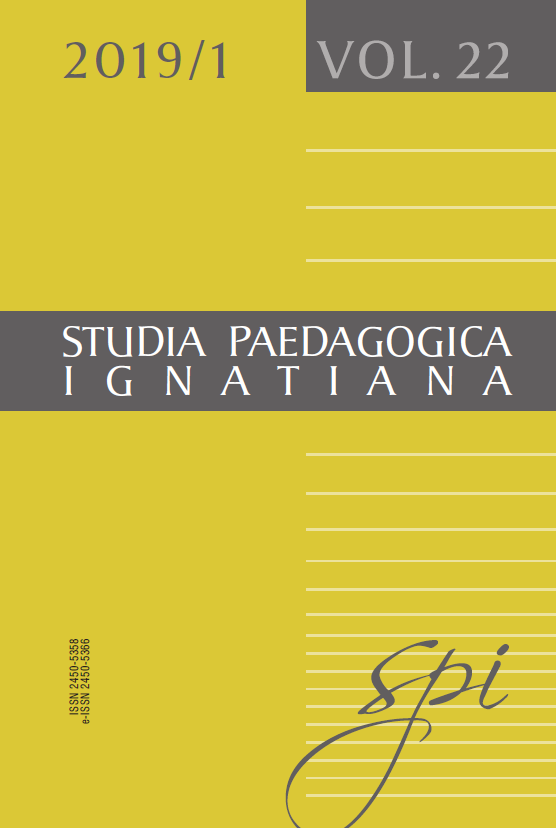The Teacher and Contemporary Stressful Phenomena in the Workplace – the Multidimensionality of Consequences and Causes
DOI:
https://doi.org/10.12775/SPI.2019.1.005Keywords
occupational stress, teacher, stressful phenomena, burnout syndrome, support fac-torsAbstract
The aim of the article is to show the characteristics of the phenomenon of professional stress in the teaching profession. Professional stress is a phenomenon that is gaining momentum in the modern world, along with economic, demographic or social changes. The profession of a teacher is part of a pool of professions characterized by a very high risk of stress within it, due to the necessity of working with other people. All the stressful factors that a teacher encounters at school undoubtedly affect their functioning, mental and physical condition and, as a result, the quality of modern education. Therefore, in the considerations I will deal with the subject of teachers’ professional stress as a still-present and growing problem, with particular emphasis on the stressful phenomena that occur in the place of employment of the main character of the article and the reasons for their occurrence. The review of the scientific literature and research reports from this area aided the illustration of a number of consequences that the stress burden in this professional group entails, not only for the teachers themselves, but also their family, relatives, the students with whom they work, and the functioning of the institution in which they are employed.
References
Adamski F., Rodzina. Wymiar społeczno-kulturowy, Wydawnictwo Uniwersytetu Jagiellońskiego, Kraków 2002.
Australian Council for Educational Research, Report on secondary teacher workload study, 2004, http://www.educationcounts.govt.nz/publications/schooling/ 11853 [dostęp: 12.07.2018].
Babiuch M., Jak pracować z rodzicami „trudnych” uczniów?, Wydawnictwa Szkolne i Pedagogiczne, Warszawa 2002.
Brenninkmeijer V., van Yperen N., Buunk B., I am not a better teacher, but others are doing worse: Burnout and perceptions of superiority among teachers, „Social Psychology of Education” 2001, nr 4, s. 259‒274.
Chmura-Rutkowska I., Getto nauczycielek – w pułapce stereotypu, w: Płeć i rodzaj w edukacji, red. M. Chomczyńska-Rubacha, WSHE, Łódź 2004, s. 109‒121.
Drabek M., Merecz D., Mościcka A., Mobbing w środowisku pracy. Charakterystyka zjawiska, jego konsekwencje, aspekty prawne i sposoby przeciwdziałania, Instytut Medycyny Pracy im. Prof. J. Nofera, Łódź 2005.
https://www.oecd-ilibrary.org/education/education-at-a-glance-2017_eag-2017-en [dostęp: 12.09.2018].
Lanza M.L., Nurses as patient assault victims: An update, synthesis and recommendations. „Archives of Psychiatric Nursing” 1992, nr 6 (3), s. 163‒171.
Elliot F.R, The family: Change or continuity?, MacMillan Press, Basingstoke–London 1986.
Krasoń K., Kształcenie nauczycieli – pytania niechciane czy koniecz-ne? Reinterpretacja kompetencji pedagogicznych na przykładzie poziomu edukacji wczesnoszkolnej, w: Edukacja jutra. Wyzwania współczesności i przyszłości, red. A. Kamińska, W. Łuszczuk, P. Oleśniewicz, Oficyna Wydawnicza Humanitas, Sosnowiec 2012, s. 161-181.
Łukasik J.M., Komunikacja a relacje w gronie nauczycieli. O rzeczywistości wykorzenionej z ideału, „Debata Edukacyjna” 2011, nr 4, s. 54‒59.
Mandal E., Kobiecość i męskość. Popularne opinie a badania naukowe, Wydawnictwo Akademickie „Żak”, Warszawa 2003.
Marten Z., Stres w pracy nauczyciela, Oficyna Wydawnicza Humanitas, Sosnowiec 2007.
Masłyk-Musiał E., Społeczeństwo i organizacje, Wydawnictwo Uniwersytetu Marii Curie- Skłodowskiej, Lublin 1999.
Polscy nauczyciele i dyrektorzy w Międzynarodowym Badaniu Nauczania i Uczenia się TALIS 2013, Instytut Badań Edukacyjnych, Warszawa 2015.
Prucha J., Pedeutologia, w: Pedagogika, red. B. Śliwerski, t. 2: Pedagogika wobec edukacji, polityki oświatowej i badań naukowych, GWP, Gdańsk 2006, s. 293–316.
Pyżalski J., Skutki oddziaływania warunków pracy na polskich nauczycieli, w: Psychospołeczne warunki pracy polskich nauczycieli. Pomiędzy wypaleniem zawodowym a zaangażowaniem, red. J. Pyżalski, D. Merecz, Oficyna Wydawnicza „Impuls”, Kraków 2010, s. 31–47.
Pyżalski J., Stresory w środowisku pracy nauczyciela, w: Psychospołeczne warunki pracy polskich nauczycieli. Pomiędzy wypaleniem zawodowym a zaangażowaniem, red. J. Pyżalski, D. Merecz, Ofi-cyna Wydawnicza „Impuls”, Kraków 2010, s. 53–75.
Pyżalski J., Plichta P., Kwestionariusz Obciążeń Zawodowych Pedagoga (KOZP). Podręcznik, Wydawnictwo Uniwersytetu Łódzkiego, Łódź 2007.
Santavirta N., Solovieva S., Theorell S., The association between job strain and emotional exhaustion in a cohort of 1,028 Finnish teachers, „British Journal of Educational Psychology” 2007, t. 77, z. 1, s. 213‒228.
Warszewska-Makuch M., Zjawisko mobbingu wśród nauczycieli, „Bezpieczeństwo Pracy” 2008, nr 5, s. 6‒9.
Żłobicki W., Rodzice i nauczyciele w edukacji wczesnoszkolnej, Oficyna Wydawnicza Impuls, Kraków 2000.
Downloads
Published
How to Cite
Issue
Section
License
By submitting an article, the author declares that:
they are the author of the article (hereinafter referred to as the Work) and:
- is entitled to exclusive and unlimited copyright to the Work,
- is entitled to dispose of the copyrights to the Work.
The Author grants the Jesuit University Ignatianum in Cracow a free, non-exclusive, territorially unlimited license to use the Work in the following fields of exploitation:
- publishing the Work in paper, digital or magnetic form;
- multiplying the work by any method, without limiting the number of editions or copies;
- distribution of the work and its copies in any form, including marketing, sales, lending, and lease;
- placing the work in a computer memory;
- distribution of the work in information networks, including the Internet;
- public performance, exhibition, display, reproduction, broadcasting and re-broadcasting, as well as making the Work available to the public in such a manner that everyone could have access to it at a time and place chosen by themselves;
- within the scope of dependent rights to the Work, covering, in particular, the right to make necessary changes to the Work, resulting from editorial and methodical preparation, as well as to make translations of the Work into other languages.
The license right shall be transferred the moment of transfer of the Work to the Jesuit University Ignatianum in Cracow. The Jesuit University Ignatianum in Cracow is entitled to grant sub-licenses to the Work in terms of the right granted. The license shall be limited in time for a period of 15 years from the date it is granted.
Stats
Number of views and downloads: 1750
Number of citations: 0



